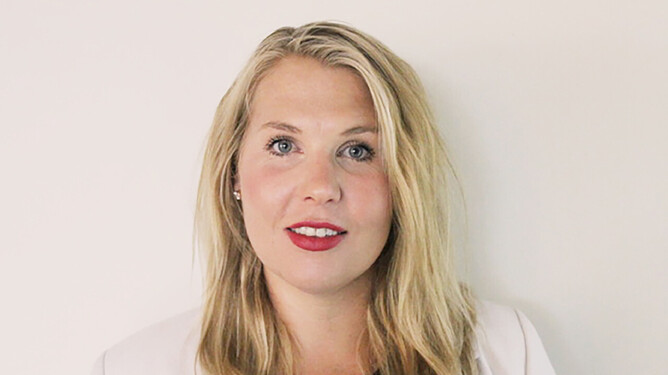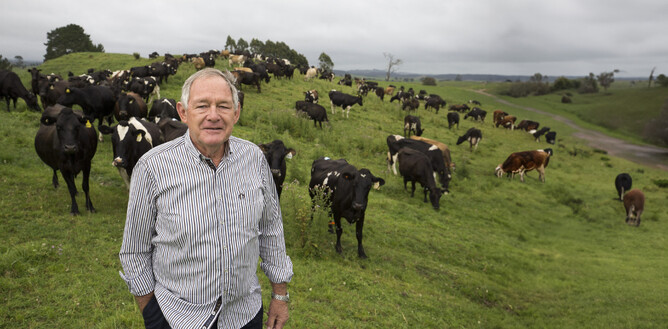Ngāi Tahu dairy farmer Victoria Trayner is the inaugural recipient of the Ian Elliott Memorial Scholarship. A $7,500 grant from Trinity Lands, the “Farming for Good” company Ian led for many years, will pay Victoria’s fees to attend the Fonterra Governance Programme in 2020.
The day after her third child was born, Victoria Trayner wrote her application for the hotly-contested Fonterra Governance Programme.
Not only was she accepted on to the course; she was also chosen as the inaugural recipient of the Ian Elliott Memorial Scholarship which covers the fees for a course participant of Māori heritage.
“I’d missed out the year before and it was the best thing for me because I really wanted it then; really wanted it.”
Victoria Trayner
Chosen for the Elliott Memorial Scholarship
Trinity Lands CEO and Fonterra board member Peter McBride helped assess the scholarship applicants and said it was clear Victoria could handle everything a demanding governance role would throw at her.
“It was clear from Victoria’s application that she was a hard-working and determined woman with an impressive depth of experience in farming, education, and advocacy – and big farming dreams.”
Peter McBride,
Trinity Lands CEO and Fonterra chair
From fine arts to farming
Victoria, 34, is a descendant of Waitaha and Ngāti Māmoe, both of which are represented by the Ngāi Tahu iwi. She is also the eldest daughter of an established farming family with dairy, pig and arable farms, and a beef stud. Victoria studied fine arts at university, then teaching while working part-time on farms and holding various leadership roles in organisations such as Young Farmers.
Developing a farming career
For five years, she taught agriculture and art at Christchurch Boys’ High School while she and her husband Glen worked hard to develop their farming careers. In 2015, they moved into a share-milking role on a family farm in Oxford, North Canterbury, but Victoria also works as a tutor for the agriculture industry training body AgITO and is a director of the Waimakariri Irrigation Company, the Waimakariri Next Generation Farmers Trust and the Canterbury Primary Sector Plan Change 7 Working Group.
A scholarship specifically for farmers
Victoria says being the recipient of a scholarship specifically for farmers of Māori descent has given her a renewed drive to learn more about her Māori heritage. She and Glen, who is of Scottish descent, are researching options for Te Reo classes.
Victoria didn’t know a lot about Ian Elliott, the late chairman of Trinity Lands in whose memory the scholarship had been established until she had won the scholarship. It was only then she discovered that Trinity Lands seeks to help young people build careers on the land and that Ian Elliott had personally mentored countless young New Zealanders working on Trinity Lands’ farms and his own properties.
“We are working hard to build our business and move towards farm ownership but, because this is my family farm, I am also constantly driving for perfection. I feel like my tūpuna [ancestors] are looking down and saying: Good luck!”
Victoria Trayner
Supporting young people in farming careers
Trinity Lands is owned by three charitable trusts, each of which was established in the 1950s and 1960s by Christian businessmen from South Waikato. The neighbours who founded the trusts initially worked together to raise funds by donating calves, then pooled their savings to buy one farm, then another – 70 years later, their grandchildren are at the helm and their modest endeavour has grown into a portfolio of farms and orchards which supports young people into farming careers and enables the distribution of hundreds of thousands in grants to community groups every year. Recipients range from in-school science programmes to food rescue trucks, to community ambulances, to ante-natal classes... to the development of Victoria Trayner’s already-significant governance nous.
Nurturing future farmers
Victoria shares Ian Elliott’s passion for developing future farmers. Five generations ago, her Scottish and Irish ancestors ventured into farming in New Zealand, initially growing potatoes and cabbages. Today, Victoria’s daughters are the fourth generation to grow up on the property where she and Glen work.
“I want my girls to have the opportunity to work on the land as well. And, not just them – a lot of town kids struggle to find their niche. When I was teaching it was so gratifying to introduce kids to Ag studies and see them head off to Lincoln with a future in farming ahead of them”
Victoria Trayner
Empowering aspirations
Victoria first heard about the Fonterra Governance Programme through her local Fonterra area manager. She is keen to learn more about governance and use that knowledge to gain seats on both the New Zealand Pork Industry Board and the Fonterra Shareholders Council. She dreams of one day being elected to the Fonterra Board: “I feel like I have quite a long way to go to get there!”
The governance programme is an intensive year-long commitment built around a series of workshops, distance learning modules and coaching sessions.
“I am extremely proud I got this scholarship and am associated with this organisation. I’m endeavouring to do Trinity Lands proud.”
Victoria Trayner
Farming opportunities for future generations
The Trayners’ newest arrival, Bonnie, is now almost three months old and gearing up to accompany Victoria (and her grandmother, who will be on childcare duty) to Auckland for the first workshop of the programme.
If Victoria has her way, this will just be the first of many opportunities Bonnie has throughout her life to watch Mum in action, determinedly fighting to ensure there are farming opportunities for future generations.
It costs $7500 for Fonterra shareholders, but many people from other primary industries pay the full $15,000 fee and join the programme to gain access to the high-calibre speakers, tutors and resources. The course content is specific to a cooperative environment and only 21 participants are chosen each year.


